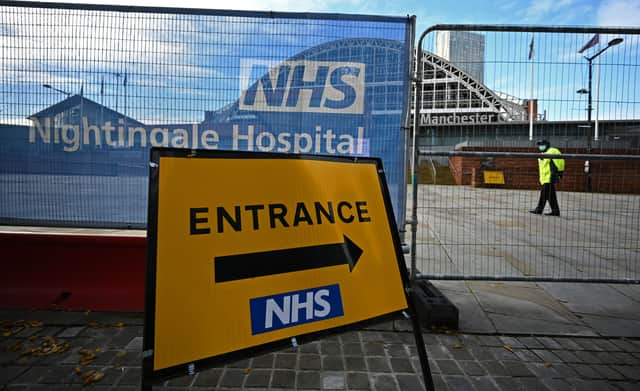Temporary NHS Nightingale hospitals to close from April - but what will happen to them?


Nightingale hospitals that were set up to cope with the increase in Covid-19 cases are due to close from April - however the sites in London and Sunderland will stay open to offer vaccination services.
NHS England said that existing hospitals have been able to increase their bed capacity so successfully, that the Nightingale hospitals are no longer required.
Advertisement
Hide AdAdvertisement
Hide AdThe network of hospitals had been established last spring in order to help the NHS in case it was overwhelmed with Covid-19 cases - but the temporary hospitals weren’t needed.
Seven Nightingale hospitals had been constructed in England, with temporary hospitals also being set up across Northern Ireland, Scotland and Wales.
In January, the Health Service Journal (HSJ) reported figures published by Minister for Innovation Lord Bethell, which placed the total cost of the temporary hospitals at around £532 million by the end of the 2022 financial year.
This estimate included costs for setting up the Nightingales, running costs, stand by costs and decommissioning costs.
‘The ultimate insurance policy’
Advertisement
Hide AdAdvertisement
Hide AdAn NHS spokesperson said: “Since the very early days of the pandemic, the Nightingale hospitals have been on hand as the ultimate insurance policy in case existing hospital capacity was overwhelmed but, as we have learned more about coronavirus, and how to successfully treat Covid, existing hospitals have adapted to significantly surge critical care capacity, and even in the winter wave - which saw more than 100,000 patients with the virus admitted in a single month - there were beds available across the country.
“Thank you to the many NHS staff and partners who worked so hard to set the Nightingales up so swiftly and of course the public who followed the guidance on controlling the spread of the virus and helped to prevent hospitals being overwhelmed.”
The spokesperson added that vaccination services will continue at London and Sunderland to support the NHS vaccination programme.
‘Monuments to the nation’
Health Secretary Matt Hancock said: “In this pandemic, our nation has had to rise to some very significant challenges, and one of those challenges has been making sure that there’s the NHS capacity we need.
Advertisement
Hide AdAdvertisement
Hide Ad“Our NHS Nightingale hospitals are monuments to this nation’s ability to get things done fast when it really matters. Built in just a matter of days, they gave us the confidence that the NHS would fulfill its timeless promise always to be there for you, to care for you and your family.
“The Nightingale hospitals played a critical role, and now thanks to the combined effort of the vaccination programme, and everybody’s commitment to stick by the rules, there are fewer than 10,000 people in hospitals across the UK. That’s down from a peak of almost 40,000 only seven weeks ago.
“Because of this progress, today we’re able to take an important step. We’re now in a position to stand down our Nightingale hospitals. This is an important moment in our national recovery and I want to thank all of those who’ve been involved in this incredible project.
“The NHS of course, who’ve led them, also the armed services who played a critical part, the private sector companies who’ve really stepped up to the fore, the landlords, the equipment manufacturers, and others coming together as a team, in difficult circumstances, at an incredibly rapid pace.
“You showed what’s best in our NHS, and what’s best in our country.”